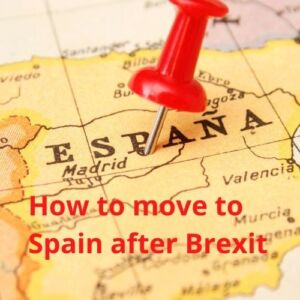
We’re now three months on from Brexit – and not quite through the pandemic – but it’s clear that there are very many Britons still hoping to move to Spain. For some, cooped up after a long-hard winter, the appetite is even stronger, whilst for others, there’s the desire for a complete reset after a watershed year. Here’s what you need to know about moving to Spain after Brexit.
So whilst we cannot just move freely back and forth as we have done for many of those 47 years of EU membership, we can still move to Spain, just like many Americans, Australians and South Africans have done.
Moving to spain: Britons are third country citizens so far as Spain is concerned
As third-country citizens, Britons not employed by a Spanish company currently have two main routes to residency: the Golden Visa and the Non-Lucrative Visa. These are for Britons who cannot prove they were living permanently in Spain before the end of 2020 and want to stay longer than 90 days at a time in the country.
The Golden Visa is perhaps the quickest way to residency if you have at least €500,000 to spend on a property (without a mortgage), or if you have already bought a home of that value, since 2013.
Each family member needs to apply, but this is a simple route of getting you and your dependents residency in Spain, and to freely travel around the Schengen zone. It requires that you have private healthcare cover (and not have a criminal record), an NIE (fiscal number) and proof of property ownership through the title deed, or preliminary contract.
The application can be made through a Spanish Embassy or Consulate directly, but it is easiest though a legal representative at Sun Lawyers.
Non-lucrative visa
If you are spending less than €500,000 on a property – or perhaps renting a home rather than buying – then the Non-Lucrative Visa (or long-stay visa) is an option. As the name suggests, this visa is not for people working (for a Spanish company) but perhaps retirees, or digital nomads.
But there is a minimum income criteria: €27,115 per year, plus €6,778 per each dependent. The key is that you can prove it’s a reliable, ongoing source of income, whether from pensions or employment. Private medical insurance is required – although the over-65s can still access healthcare through the S1 healthcare entitlement certificate (for those in receipt of a UK state pension).
This visa is obtained through the Spanish Consulates in the UK (London and Edinburgh) before you leave for Spain.
Whether you take either of these visa routes, you will then need to apply for TIE (foreigner’s identity card) and register with the Padron (census) in your local municipality within a month of arriving in Spain.
Do also bear in mind – in both scenarios – that if you spend more than 180 days (six months) at a time in Spain you will automatically become tax resident in Spain (this is not the same as legal residency).
In due course there is hope that the Spanish government might agree to Britons being able to spend 180 consecutive days in Spain, as per the rights of Spanish citizens in the UK. But for those seeking to move over fully, there’s hope that a bilateral agreement that widens the reciprocal rights for British and Spanish citizens might make a new life in Spain within easier reach again.
For information about moving to Spain, the visa application process or anything else, simply send an email to Sun Lawyers with your enquiry and will will reply as soon as we can. Send your email to: Sun Lawyers
Article by Liz Rowlinson, property journalist commissioned by Sun Lawyers.

